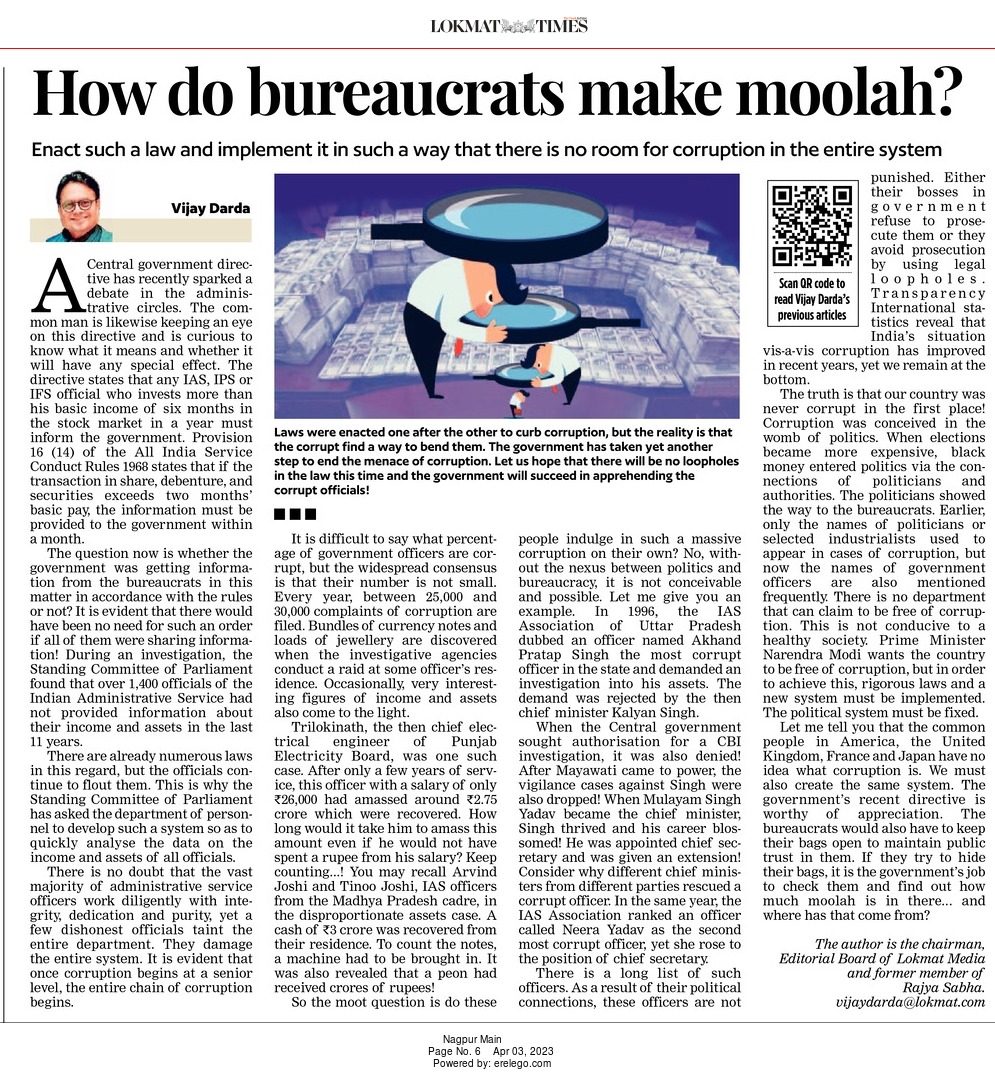How do bureaucrats make moolah?
 By Vijay Darda | 03-04-2023
By Vijay Darda | 03-04-2023
Enact such a law and implement it in such a way that there is no room for corruption in the entire system
Vijay Darda
A Central government directive has recently sparked a debate in the administrative circles. The common man is likewise keeping an eye on this directive and is curious to know what it means and whether it will have any special effect. The directive states that any IAS, IPS or IFS official who invests more than his basic income of six months in the stock market in a year must inform the government. Provision 16 (14) of the All India Service Conduct Rules 1968 states that if the transaction in share, debenture, and securities exceeds two months’ basic pay, the information must be provided to the government within a month.
The question now is whether the government was getting information from the bureaucrats in this matter in accordance with the rules or not? It is evident that there would have been no need for such an order if all of them were sharing information! During an investigation, the Standing Committee of Parliament found that over 1,400 officials of the Indian Administrative Service had not provided information about their income and assets in the last 11 years.
There are already numerous laws in this regard, but the officials continue to flout them. This is why the Standing Committee of Parliament has asked the department of personnel to develop such a system so as to quickly analyse the data on the income and assets of all officials.
There is no doubt that the vast majority of administrative service officers work diligently with integrity, dedication and purity, yet a few dishonest officials taint the entire department. They damage the entire system. It is evident that once corruption begins at a senior level, the entire chain of corruption begins.
It is difficult to say what percentage of government officers are corrupt, but the widespread consensus is that their number is not small. Every year, between 25,000 and 30,000 complaints of corruption are filed. Bundles of currency notes and loads of jewellery are discovered when the investigative agencies conduct a raid at some officer’s residence. Occasionally, very interesting figures of income and assets also come to the light.
Trilokinath, the then chief electrical engineer of Punjab Electricity Board, was one such case. After only a few years of service, this officer with a salary of only `26,000 had amassed around `2.75 crore which were recovered. How long would it take him to amass this amount even if he would not have spent a rupee from his salary? Keep counting…! You may recall Arvind Joshi and Tinoo Joshi, IAS officers from the Madhya Pradesh cadre, in the disproportionate assets case. A cash of `3 crore was recovered from their residence. To count the notes, a machine had to be brought in. It was also revealed that a peon had received crores of rupees!
So the moot question is do these people indulge in such a massive corruption on their own? No, without the nexus between politics and bureaucracy, it is not conceivable and possible. Let me give you an example. In 1996, the IAS Association of Uttar Pradesh dubbed an officer named Akhand Pratap Singh the most corrupt officer in the state and demanded an investigation into his assets. The demand was rejected by the then chief minister Kalyan Singh.
When the Central government sought authorisation for a CBI investigation, it was also denied! After Mayawati came to power, the vigilance cases against Singh were also dropped! When Mulayam Singh Yadav became the chief minister, Singh thrived and his career blossomed! He was appointed chief secretary and was given an extension! Consider why different chief ministers from different parties rescued a corrupt officer. In the same year, the IAS Association ranked an officer called Neera Yadav as the second most corrupt officer, yet she rose to the position of chief secretary.
There is a long list of such officers. As a result of their political connections, these officers are not punished. Either their bosses in government refuse to prosecute them or they avoid prosecution by using legal loopholes. Transparency International statistics reveal that India’s situation vis-a-vis corruption has improved in recent years, yet we remain at the bottom.
The truth is that our country was never corrupt in the first place! Corruption was conceived in the womb of politics. When elections became more expensive, black money entered politics via the connections of politicians and authorities. The politicians showed the way to the bureaucrats. Earlier, only the names of politicians or selected industrialists used to appear in cases of corruption, but now the names of government officers are also mentioned frequently. There is no department that can claim to be free of corruption. This is not conducive to a healthy society. Prime Minister Narendra Modi wants the country to be free of corruption, but in order to achieve this, rigorous laws and a new system must be implemented. The political system must be fixed.
Let me tell you that the common people in America, the United Kingdom, France and Japan have no idea what corruption is. We must also create the same system. The government’s recent directive is worthy of appreciation. The bureaucrats would also have to keep their bags open to maintain public trust in them. If they try to hide their bags, it is the government’s job to check them and find out how much moolah is in there… and where has that come from?
Relevant Articles
Melodrama of dirty politics has struck a deep wound
Stop playing with the honour of Maharashtra
Adopt approach of respect, dialogue, goodwill towards taxpayers
Two budgets, one theme: Dream and hope
